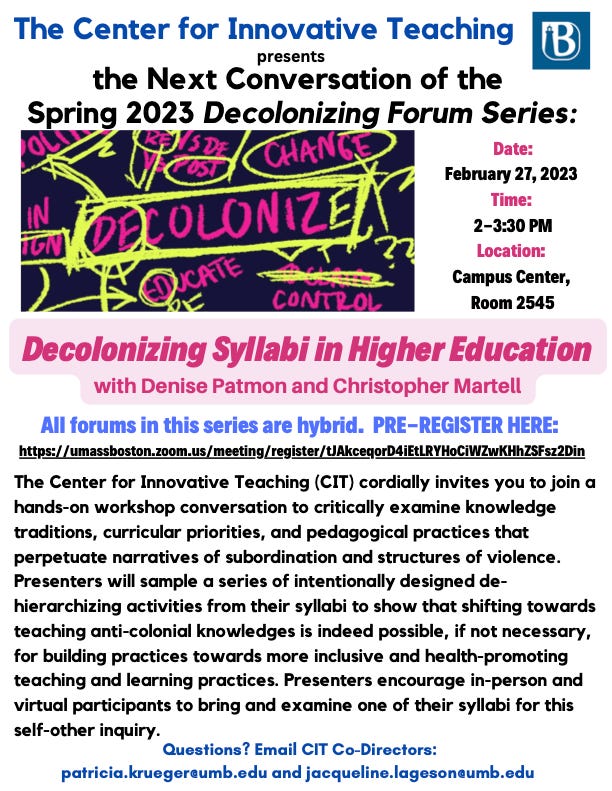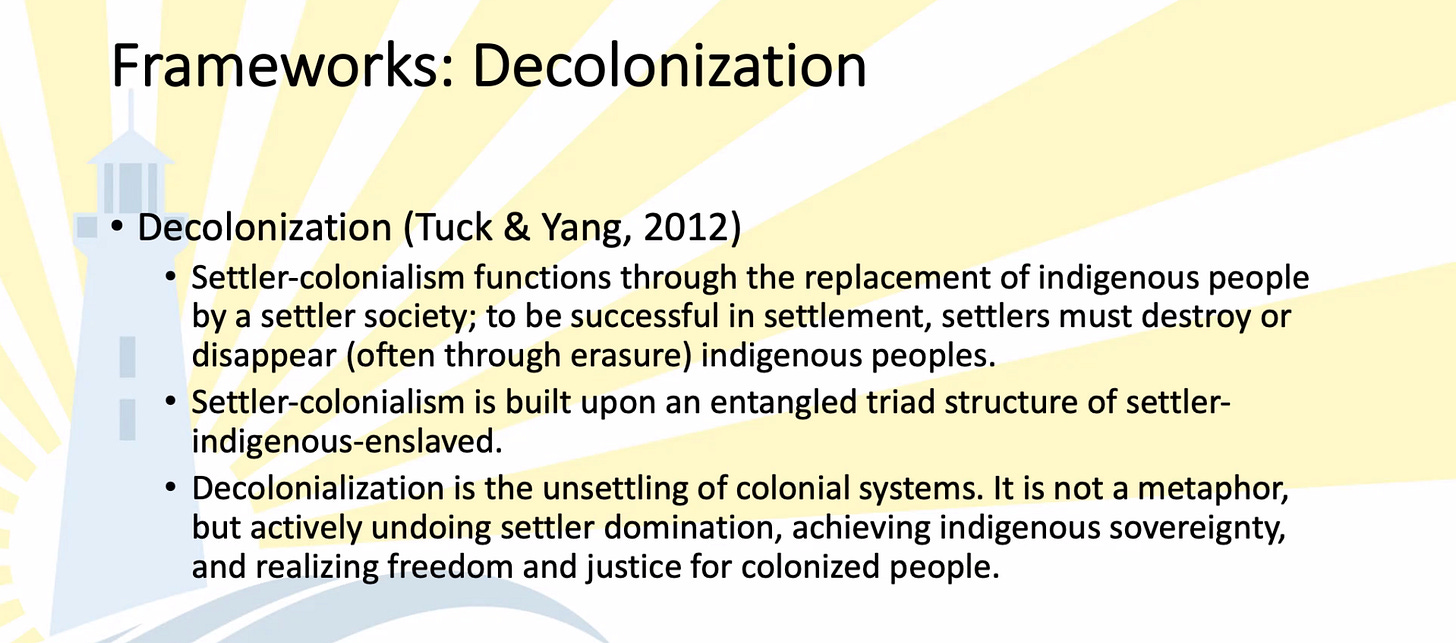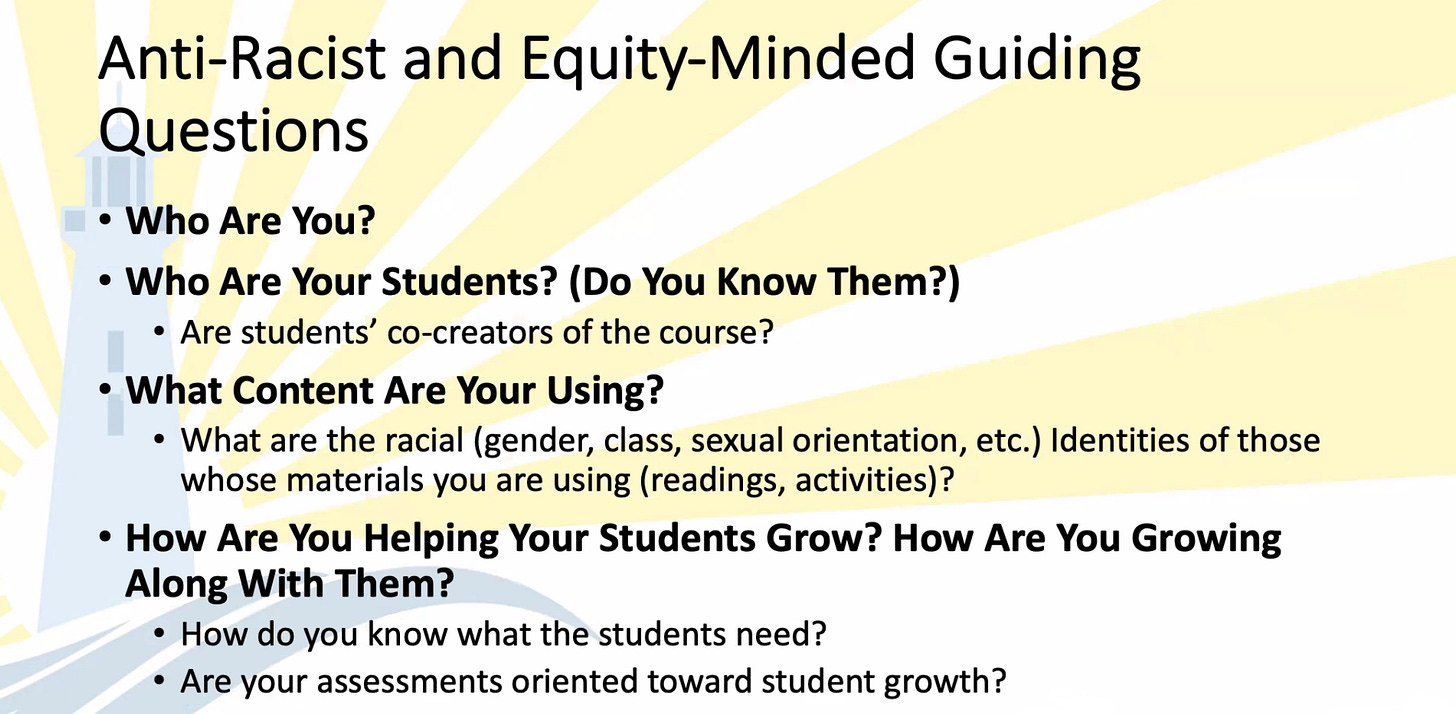Decolonizing Learning
Welcome to the post-humanist paradise. "Decolonizing Forum Series: Decolonizing Syllabi in Higher Education", February 27, 2023
This is a part of the “Decolonizing” series. See here, here, here, here and here for previous takes. We thank our special reporter, McGoohan, for the screenshots and a report.
Welcome to the post-humanist paradise! Babies are randomly redistributed between the parents, “genius” is an artificial construct, talent does not exist, merit is illusory. The prophetic “Harrison Bergeron” foresaw all of that a long time ago. What it couldn’t foresee however, is that here, in the woke Eden, only our achievements are identical, but we, as individuals, are not. Each of us is a distinct node of a multidimensional intersecting oppression matrix. We are all very different, but only through the immutable. Here, in the post-liberal successor-ideology heaven, learning has no use: you are who you were at birth, and you will remain such till your death.
Unless, of course, you decolonize learning.
The new approach to syllabi reflects this vision…
We start with a definition of settler-colonialism. Do the organizers literally mean to unsettle the colonial system by giving back the land? Your guess is as good as ours.
Next comes St. Kendi and the National Museum of African-American History and Culture (yes, that one, the one responsible for this gem, the one that became a shrine for St. Kendi and his invaluable teachings).
Now, the synthesis: race and anti-racism should be at the core of every syllabus and every course, be it Quantum Physics, Analysis of Algorithms, Differential Equations, or Greek Mythology. The quality of the actual course material is tangential to the REAL goal, equity.
Q: Excuse me, will I have enough time to teach the actual algorithms or quantum physics?
A: You bigot! Why do you even ask this cis-hetero-white-patriarchal question?
Now that we got this out of the way and clarified what you should REALLY teach, it’s time for the equity guided questions every teacher must ask (our comments in bold):
Who are you? A profound philosophical question, the answer to which is still debated.
Are students’ (sic) co-creators of the course? If they knew the subject to co-create the course they wouldn’t have to take it, would they? Oops, sorry, that’s a bigoted question. Equity is more important than the subject.
What are the racial or other intersecting identities of those whose materials are using? We already established that identities are more important than content.
How do you know what the students need? This is a rhetorical question. Of course you don’t. That’s why we’re here, and this is a great time to move on to…
…the syllabus equity tool, courtesy of the California Community Colleges, upon which you are to reflect if you want to reconstruct a course syllabus within a decolonized and anti-racist framework. Selected highlights: (again, our comments are in bold):
What books, articles, and readings have been selected in your course? Are your course resources inclusive to race, socio-economic standing, gender, sexuality, disability, immigration status, English language learner, and first-generation students? If someone knows how a quantum physics or algebraic geometry textbook can be inclusive of sexuality, let us know.
Do students have input in shaping content and co-creating community rules outlined in the course syllabus? Sure. Why not? Why don’t they also grade themselves? Oh wait, it is already happening.
Allocating points can cause students to assume they have no room for growth, and therefore they may drop out of the course (Rose, 2017). Faculty may consider holistic modalities and progression steps—for example, beginning, emerging, and proficiency—to develop opportunities for the learner to grow (Feldman, 2019) before finalizing student grading in the class. We know that points, or any quantitative assessment, is bigoted and a sign of whiteness, but this is not enough! To foster a true sense of belonging, faculty should also give out slime, putty and colorful stickers.
Are mistakes expected, respected, and used to elevate students’ understanding of the subject? Do you offer opportunities for retaking missed or late work? What opportunities do students have to catch up if they are behind due to technological barriers or other personal deterrents? Does the workplace allow unlimited retakes and constant lateness? Here’s your answer.
Do your course syllabus and Canvas site include positive messages and affirmations to further validate and provide a greater sense of belonging for BIPOC students in the course? Do the images and videos in the course showcase diversity and representation of the students? Do the authors think BIPOC students can’t succeed without constant coddling and validation? Sounds a bit racist, doesn’t it?
No more excuses, folx. It’s time to repent your sins and unlearn your colonial ways. Or, as the California Community Colleges page sums up beautifully:
The only way to dismantle inequities and institutionalize anti-racism in teaching for BIPOC students is to provide ongoing professional development workshops. Anti-racism curriculum begins with faculty deeply reflecting about themselves, the content they are delivering, and who their BIPOC students really are. When deeply reflecting, one is aware of one’s own implicit and unconscious bias that one has as an educator (Wood, 2019). For anti-racism to be institutionalized, all constituents on a college campus must reflect and participate in the call to action rather than just faculty.
In other words - from now on, you must cease all your bigoted scientific research and teaching activities, dedicate all of your time, resources, and energy to reflecting upon your inequitable ways, undergo professional development workshops where your behavior will be monitored carefully, and start providing endless validation and reassurances to the BIPOC students, whether they want it or not - we know what’s best for them, after all! Our trained and handsomely paid cadres of DEI commissars will make sure no one strays or pushes back.








